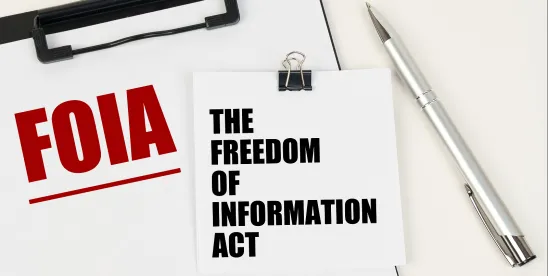The Freedom of Information Act (FOIA), enacted in 1966, grants the public the right to access records from any federal agency, promoting transparency and accountability in government. Whether you’re a business owner, researcher, journalist, or private citizen, understanding the FOIA process — and how to challenge an agency’s response — is essential for ensuring your access rights are protected.
Step 1: Submitting a FOIA Request
To initiate a FOIA request:
- Identify the Agency – Determine which federal agency holds the records you’re seeking. Each agency processes its own FOIA requests.
- Draft the Request – Clearly describe the documents you seek. Be as specific as possible, including names, dates, locations, or subject matter to help narrow the search.
- Submit the Request – Most agencies accept requests via email, web portals, or mail. Ensure your request is directed to the correct FOIA office and that it includes your contact information. Alternatively, FOIA.gov offers a submission portal for every federal agency subject to FOIA.
- Fees and Waivers – Agencies may charge fees for search, duplication, or review time. You can request a fee waiver by demonstrating that disclosure is in the public interest.
Once submitted, agencies are generally required to respond within 20 business days, though this period can be extended for “unusual circumstances.”
Step 2: Appealing a Denial or Inadequate Response
If your request is denied in whole or in part, or if you receive no substantive response within 20 business days (absent any extensions), you can file an administrative appeal.
- Deadlines – You typically must file your appeal within 90 days of the denial. Check the agency’s FOIA regulations for specific timelines.
- Format – Appeals must be in writing and should include:
- A copy of the original FOIA request.
- The agency’s response (or a statement of the lack thereof).
- Arguments explaining why the denial was improper.
- Grounds for Appeal – Common bases include improper redactions, unjustified use of exemptions, failure to conduct an adequate search, or lack of timely response.
Agencies are required to decide administrative appeals within 20 business days. If the appeal is denied or ignored, the next step is usually litigation.
Step 3: Challenging the FOIA Response in Court
You have the right to challenge a denial in federal district court.
- Jurisdiction – You generally can file a lawsuit in the district where you live, where the records are located, or in the District of Columbia.
- Timing – You may sue after exhausting administrative remedies (i.e., completing the appeal process), or if the agency fails to respond to your original request or appeal within the statutory deadline.
- Scope of Judicial Review – Courts will examine whether the agency:
- Properly invoked FOIA exemptions.
- Conducted an adequate and reasonable search.
- Complied with procedural requirements.
- Burden of Proof – The government bears the burden of justifying its withholding or redactions. Courts may order the release of improperly withheld records.
- Attorneys’ Fees – If you substantially prevail in litigation, the court may award reasonable attorneys’ fees and litigation costs.
Final Thoughts
The FOIA process can be complex and time consuming, especially when agencies resist disclosure. However, the law provides multiple avenues for redress. Whether through administrative appeal or litigation, you have tools to hold the government accountable and access the records that shape public policy.





 />i
/>i
